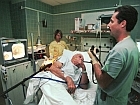 Researchers at Dartmouth Medical School have compiled years of research about
Researchers at Dartmouth Medical School have compiled years of research about
health policy and health outcomes, and one stunning conclusion seems
certain: spending more money on health care doesn’t necessarily yield
better health outcomes.
In the culmination of VPR’s week-long series on
the future of health care in Vermont, Bob Kinzel talks with Dr. Gil
Welch from Dartmouth’s institute on Outcomes Research and Health
Policy.
Also, analysis of the week’s big news stories with VPR’s John Dillon and
Bill Schubart comments on the hard plitical choices that need to be made
to fix the health care system.
Listener comments on this program:
Kathy from Underhill:
My husband and I own a small business with 6 employees so I’m sure you
already know how high our premiums have been for mediocre health plans.
It has been difficult to keep coverage, yet we felt it was important
and so we’ve continued to pay ever higher premiums. We feel we are
being penalized for doing the right thing because small businesses that
have provided health coverage during the past year, can not join
Catamount Health and take advantage of the lower premiums. Is there any
talk of allowing small businesses that currently provide coverage to
join Catamount Health in the future? If not, it is very tempting to
drop coverage for our employees for a year so we can join. Employers
dropping coverage to take advantage of Catamount Health seems to be
exactly the opposite of the goal of getting more Vermonters covered.
Chris from Burlington:
Regarding this discussion–poor correlation of health care costs with
quality measures–see the following article in the December 10 New Yorker
Magazine: "The Checklist" — by Atul Gawande. This leaves out a lot of important context.
David from Wolcott:
One of the primary reasons we have a health care crisis in the US is due to the fact that we take the wrong approach to healthcare, which is an oxymoron in the US because we do not offer healthcare, but rather disease management. We treat drugs as the sacred cow/holy grail (which is due to the corrupt campaign contribution system that allows Big Pharma to buy politicians and block measures that will truly allow a person to achieve health). Drugs are chemicals, they have side effects (but that’s o.k. because Big Pharma has another drug that will target the side effects of the first drug, and so on). In many, if not most cases, natural treatmens will offer equal or better outcomes. Drug companies lie by telling us that they need big price tags to sustain R&D, when the reality is that they spend more on ads than R&D. If drugs are so good, why does Big Pharma have one of the largest lobbying bodies in D.C., and why does the FDA allow themselves to be bought off in order to allow bad drugs to stay on the market?